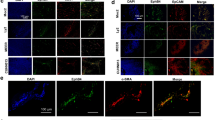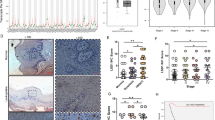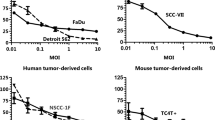Abstract
Unlike normal mucosal squamous epithelial cells, head and neck squamous cell carcinomas (HNSCCs) overexpress TGF-α mRNA and protein which is required to sustain the proliferation of HNSCC cells in vitro. To determine whether TGF-α expression contributes to tumor growth in vivo, cationic liposome-mediated gene transfer was used to deliver an antisense expression construct targeting the human TGF-α gene into human head and neck tumor cells, grown as subcutaneous xenografts in nude mice. The TGF-α antisense gene was immediately detected in the cytoplasm of the tumor cells, translocated to the nucleus by 12 h and remained localized to the nucleus for up to 3 days. Direct inoculation of the TGF-α antisense (but not the corresponding sense) construct into established HNSCC tumors resulted in inhibition of tumor growth. Sustained antitumor effects were observed for up to 1 year after the treatments were discontinued. Down-modulation of TGF-α was accompanied by increased apoptosis in vivo. These experiments indicate that interference with the TGF-α/EGFR autocrine signaling pathway may be an effective therapeutic strategy for cancers which overexpress this ligand/receptor pair.
This is a preview of subscription content, access via your institution
Access options
Subscribe to this journal
Receive 12 print issues and online access
$259.00 per year
only $21.58 per issue
Buy this article
- Purchase on Springer Link
- Instant access to full article PDF
Prices may be subject to local taxes which are calculated during checkout







Similar content being viewed by others
References
Todaro GJ, De Larco JE . Transformation by murine and feline sarcoma viruses specifically blocks binding of epidermal growth factor to cells Nature 1976 264: 26–31
Todaro GJ, Fryling C, De Larco JE . Transforming growth factors produced by certain human tumor cells: polypeptides that interact with epidermal growth factor receptors Proc Natl Acad Sci USA 1980 77: 5258–5262
Barrandon Y, Green H . Cell migration is essential for sustained growth of deratinocyte colonies: the roles of transforming growth factor-alpha and epidermal growth factor Cell 1987 50: 1131–1137
Coffey RJ Jr et al. Production and auto-induction of transforming growth factor-alpha in human keratinocytes Nature 1987 328: 817–820
Liscia DS et al. Transforming growth factor-alpha messenger RNA localization in the developing adult rat and human mammary gland by in situ hybridization Dev Biol 1990 140: 123–131
Thomas DM, Nasim MM, Gullick WJ, Alison MR . Immunoreactivity of transforming growth factor alpha in the normal adult gastrointestinal tract Gut 1992 33: 628–631
Kudlow JE et al. Transforming growth factor-alpha in the mammalian brain. Immunohistochemical detection in neurons and characterization if its mRNA J Biol Chem 1989 264: 3880–3883
Xynos FP et al. Expression of transforming growth factor alpha mRNA in benign and malignant tissues derived from gynecologic patients with various proliferative conditions Anticancer Res 1992 12: 1115–1120
Gomella LG et al. Expression of transforming growth factor alpha in normal human adult kidney and enhanced expression of transforming growth factors alpha and beta 1 in renal cell carcinoma Cancer Res 1989 49: 6972–6975
Rosenthal A et al. Expression in rat fibroblasts of a human transforming growth factor-alpha cDNA results in transformation Cell 1986 46: 301–309
Sandgren EP et al. Overexpression of TGF alpha in transgenic mice: induction of epithelial hyperplasia, pancreatic metaplasia, and carcinoma of the breast Cell 1990 61: 1121–1135
Gewirtz AM . Am Society of Clin Oncol-Educational Book Bostrom Corp: Chicago 1995 pp 192–196
Saxena A, Ali IU . Increased expression of genes from growth factor signaling pathways in glioblastoma cell lines Oncogene 1992 7: 243–247
Bates SE, Davidson NE, Valverius EM . Expression of transforming growth factor alpha and its messenger ribonucleic acid in human breast cancer: its regulation by estrogen and its possible functional significance Mol Endocrinol 1988 2: 543–545
Dickson RB et al. Growth factors in breast cancer: mitogenesis to transformation J Steroid Biochem Mol Biol 1992 43: 69–78
Iihara K et al. Prognostic significance of transforming growth factor-alpha in human esophageal carcinoma. Implication for the autocrine proliferation Cancer 1993 71: 2902–2909
Smith JM, Derynck R, Korc M . Production of transforming growth factor alpha in human pancreatic cancer cells: evidence for a superagonist autocrine cycle Proc Natl Acad Sci USA 1987 84: 7567–7570
Barton CM et al. Transforming growth factor alpha and epidermal growth factor in human pancreatic cancer J Pathol 1991 163: 111–116
Yeh YC et al. Elevation of transforming growth factor alpha and its relationship to the epidermal growth factor and alpha-fetoprotein levels in patients with hepatocellular carcinoma Cancer Res 1987 47: 896–901
Liu C, Woo A, Tsao MS . Expression of transforming growth factor-alpha in primary human colon and lung carcinomas Br J Cancer 1990 62: 425–429
Tanaka S et al. Immunoreactive transforming growth factor alpha is commonly present in colorectal neoplasia Am J Pathol 1991 139: 123–129
Tateishi M et al. Immunohistochemical evidence of autocrine growth factors in adenocarcinoma of the human lung Cancer Res 1990 50: 7077–7080
Mydlo JH et al. Expression of transforming growth factor alpha and epidermal growth factor receptor messenger RNA in neoplastic and nonneoplastic human kidney tissue Cancer Res 1989 49: 3407–3411
Mellon JK, Cook S, Chambers P, Neal DE . Transforming growth factor alpha and epidermal growth factor levels in bladder cancer and their relationship to epidermal growth factor receptor Br J Cancer 1996 73: 654–658
Reiss M, Stash EB, Vellucci VF, Zhou Z . Activation of the autocrine transforming growth factor alpha pathway in human squamous carcinoma cells Cancer Res 1991 51: 6254–6262
Morishige K et al. Involvement of transforming growth factor alpha/epidermal growth factor receptor autocrine growth mechanism in an ovarian cancer cell line in vitro Cancer Res 1991 51: 5951–5955
Todd R et al. TGF-alpha and EGF-receptor mRNAs in human oral cancers Carcinogenesis 1989 10: 1553–1556
Rubin Grandis J, Tweardy DJ . Elevated levels of transforming growth factor alpha and epidermal growth factor receptor messenger RNA are early markers of carcinogenesis in head and neck cancer Cancer Res 1993 53: 3579–3584
Rubin Grandis J, Melhem MF, Barnes EL, Tweardy DJ . Quantitative immunohistochemical analysis of transforming growth factor-alpha and epidermal growth factor receptor in patients with squamous cell carcinoma of the head and necck Cancer 1996 78: 1284–1292
Di Marco E et al. Autocrine interaction between TGF alpha and the EGF-receptor: quantitative requirements for induction of the malignant phenotype Oncogene 1989 4: 831–838
Moroni MC, Willingham MC, Beguinot L . EGF-R antisense RNA blocks expression of the epidermal growth factor receptor and suppresses the transforming phenotype of a human carcinoma cell line J Biol Chem 1992 267: 2714–2722
Atlas I et al. Growth regulation of human renal carcinoma cells: role of transforming growth factor alpha Cancer Res 1992 52: 335–339
Rubin Grandis J et al. Tumor levels of TGF-α and EGFR protein predict survival in patients with head and neck squamous cell carcimona J Natl Cancer Inst 1998 90: 824–832
Rubin Grandis J et al. Downmodulation of TGF-alpha protein expression with antisense oligonucleotides inhibits proliferation of head and neck squamous carcinoma but not normal mucosal epithelial cells J Cell Biochem 1998 69: 55–62
He Y et al. Inhibition of human squamous cell carcinoma growth in vivo by epidermal growth factor receptor antisense RNA transcribed from the U6 promoter J Natl Cancer Inst 1998 90: 1080–1087
Rubin Grandis J, Zeng Q, Tweardy DJ . Retinoic acid normalizes the increased gene transcription rate of TGF-alpha and EGFR in head and neck cancer cell lines Nature Med 1996 2: 237–240
Rubin Grandis J, Tweardy DJ, Melhem MF . Asynchronous modulation of transforming growth factor-alpha and epidermal growth factor receptor protein expression in progression of premalignant lesions to head and neck squamous cell carcinoma Clin Cancer Res 1998 4: 13–20
Imanishi KI et al. Inhibition of growth of human lung adenocarcinoma cell lines by anti-transforming growth factor-alpha monoclonal antibody J Natl Cancer Inst 1989 81: 220–223
Filmus J, Shi W, Spencer T . Role of transforming growth factor alpha (TGF-alpha) in the transformation of ras-transfected rat intestinal epithelial cells Oncogene 1993 8: 1017–1022
Sizeland AW, Burgess AW . Antisense transforming growth factor alpha oligonucleotides inhibit autocrine stimulated proliferation of a colon carcinoma cell line Mol Biol Cell 1992 3: 1235–1243
Solorzano CC et al. Inhibition of transforming growth factor alpha stimulation of human squamous cell carcinoma of the head and neck with anti-TGF-alpha antibodies and tyrphostin Ann Surg Oncol 1997 4: 670–678
Laird AD, Brown PI, Fausto N . Inhibition of tumor growth in liver epithelial cells transfected with a transforming growth factor alpha antisense gene Cancer Res 1994 54: 4224–4232
Rubenstein M, Mirochnik Y, Chou P, Guinan P . Antisense oligonucleotide intralesional therapy for human PC-3 prostate tumors carried in athymic nude mice J Surg Oncol 1996 62: 194–200
Gewirtz AM et al. Bone marrow purging with oligodeoxynucleotides Blood 1996 88: 1517
Webb A et al. Bcl-2 antisense therapy in patients with non-Hodgkin lymphoma Lancet 1997 349: 1137–1141
Cammilleri S et al. Biodistribution of iodine-125 tyramine transforming growth factor alpha antisense oligonucleotide in athymic mice with a human mammary tumor xenograft following intratumoral injection Eur J Nucl Med 1996 23: 448–452
He Y, Huang L . Growth inhibition of human papillomarvirus 16 DNA-positive mouse tumor by antisense RNA transcribed from U6 promoter Cancer Res 1997 57: 3993–3999
Nabel GJ et al. Direct gene transfer with DNA–liposome complexes in melanoma: expression, biologic activity, and lack of toxicity in humans Proc Natl Acad Sci USA 1993 90: 11307–11311
Caplen NJ et al. Liposome-mediated CFTR gene transfer to the nasal epithelium of patients with cystic fibrosis Nature Med 1995 1: 39–46
Noonberg SB et al. In vivo generation of highly abundant sequence-specific oligonucleotides for antisense and triplex gene regulation Nucleic Acids Res 1994 22: 2830–2836
Mahr S et al. Growth factor effects on apoptosis of rat gastric enterochromaffin-like cells Endocrinology 1998 139: 4380–4390
Brison DR, Schultz RM . Increased incidence of apoptosis in transforming growth factor alpha-deficient mouse blastocytes Biol Reprod 1998 59: 136–144
Amundadottir LT et al. Cooperation of TGF alpha and c-myc in mouse mammary tumorigenesis: coordinated stimulation of growth and suppression of apoptosis Oncogene 1996 13: 757–765
Seki S et al. Induction of apoptosis in a human hepatocellular carcinoma cell line by a neutralizing antibody to transforming growth factor-alpha Virchows Arch 1997 430: 29–35
Nakamura N, Shikoji Y, Moriwaki H, Muto Y . Apoptosis in human hempatoma cell line induced by 4,5-didehydro geranylgeranoic acid (acyclic acid) via down-regulation of transforming growth factor-alpha Biochem Biophys Res Commun 1996 219: 100–104
Rubin Grandis J, Chakraborty A, Melhem MF, Tweardy DJ . Inhibition of epidermal growth factor receptor gene expression and function decreases proliferation of head and neck squamous carcinoma but not normal mucosal epithelial cells Oncogene 1997 15: 409–416
Ciardiello F et al. Cooperative inhibition of renal cancer growth by anti-epidermal growth factor receptor antibody and protein kinase A antisense oligonucleotide J Natl Cancer Inst 1998 90: 1087–1094
De Luca A et al. Antisense oligonucleotides directed against EGF-related growth factors enhance anti-proliferative effect of conventional anti-tumor drugs in human colon-cancer cells Int J Cancer 1997 73: 277–282
Qian JF, Lazar-Wesley E, Breugnot C, May E . Human transforming growth factor alpha: sequence analysis of the 4.5-kb and 1.6-kb mRNA species Gene 1993 132: 291–296
Sacks PG et al. Establishment and characterization of two new squamous cell carcinoma cell lines derived from tumors of the head and neck Cancer Res 1988 48: 2858–2866
Drenning SD et al. Bcl-2 but not Bax expression is associated with apoptosis in normal and transformed squamous epithelium Clin Cancer Res 1998 4: 2913–2921
Acknowledgements
We are grateful to Dr Reuben Lotan for the gift of the cell line 1483. This work was supported in part by Public Health Service grants CA01760, CA72526, and CA77038 from The National Cancer Institute (to JRG), The Eye and Ear Foundation, The Pittsburgh Foundation, The Mary Hillman Jennings Foundation and the Veterans Research Foundation of Pittsburgh.
Author information
Authors and Affiliations
Rights and permissions
About this article
Cite this article
Endo, S., Zeng, Q., Burke, N. et al. TGF-α antisense gene therapy inhibits head and neck squamous cell carcinoma growth in vivo. Gene Ther 7, 1906–1914 (2000). https://doi.org/10.1038/sj.gt.3301315
Received:
Accepted:
Published:
Issue Date:
DOI: https://doi.org/10.1038/sj.gt.3301315
Keywords
This article is cited by
-
Inhibition of human non-small cell lung tumors by a c-Met antisense/U6 expression plasmid strategy
Gene Therapy (2004)
-
Activation of Stat3 by cell confluence reveals negative regulation of Stat3 by cdk2
Oncogene (2003)
-
The role of epidermal growth factor receptor in head and neck squamous cell carcinoma
Current Oncology Reports (2003)
-
Biología Molecular de los cánceres de cabeza y cuello
Revista de Oncología (2003)
-
Differential function of STAT5 isoforms in head and neck cancer growth control
Oncogene (2002)



